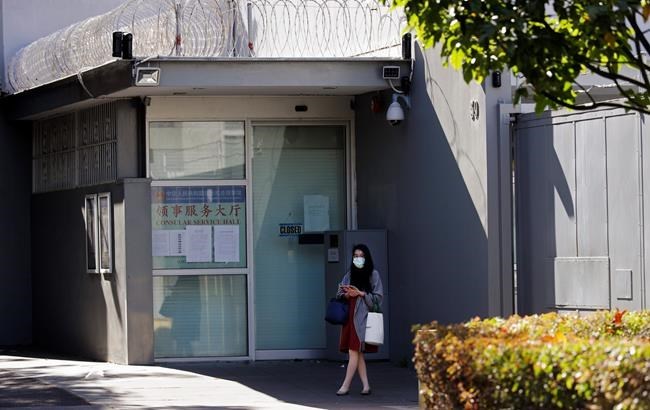
A woman stands in front of the Chinese consulate in Sydney, Wednesday, Sept. 16, 2020. A Chinese-born adviser to an Australian lawmaker has launched a constitutional challenge in Australia's highest court against the nation's laws that ban covert foreign interference on domestic politics. (AP Photo/Rick Rycroft)
Republished September 16, 2020 - 4:46 AM
Original Publication Date September 15, 2020 - 8:46 PM
CANBERRA, Australia - A Chinese-born adviser to an Australian lawmaker has launched a constitutional challenge in Australia’s highest court against laws banning covert foreign interference in domestic politics, citing a burden on free speech.
John Shi Sheng Zhang is also challenging the validity of search warrants executed by police at his Sydney home and offices in June as part of an investigation into illegal foreign interference, according to court documents seen by The Associated Press on Wednesday.
Zhang is an adviser to New South Wales state lawmaker Shaoquett Moselmane, whose membership in the opposition Labor Party was suspended after police raids on Moselmane's and Zhang’s homes and business addresses in June.
China's foreign ministry on Wednesday rejected suspicions that Chinese diplomats had attempted to infiltrate the Labor Party and influence voters though Zhang.
The June raids were the first police investigation to grab public attention since the foreign interference laws came into force in 2018 and the government bolstered funding to security agencies late last year to enforce them.
The laws angered China and stoked increasing tensions between the nations.
In Zhang’s court documents, filed in August, he said he was accused of acting with others on behalf of the “Chinese state and party apparatus” in a “private social media chat group and other fora” with Moselane to “advance the interests and the policy goals of a foreign principal, being the Chinese government.”
Zhang, a 62-year-old Australian citizen who immigrated from China in 1989, is also accused of “providing support and encouragement” to Moselmane for the “advocacy of Chinese state interests."
It is also alleged that Zhang and others “concealed from or failed to disclose” to Moselmane that they were working with Chinese state and Communist party apparatus including the Ministry of State Security and the United Front Work Department.
The case will likely be listed for its first preliminary hearing before a judge within weeks.
Police have confirmed that search warrants were executed in Sydney in June, but have yet to give details about how many or who was targeted.
During the June raids, Australian police accessed the communications of Chinese diplomats and named a Chinese consul, Sun Yantao, in a warrant, Australian Broadcasting Corp. reported on Wednesday.
ABC said it has seen search warrants used in June that revealed police were investigating whether China’s consulate in Sydney conspired with Zhang in a plot to infiltrate the Labor Party and influence voters.
Chinese foreign ministry spokesperson Wang Wenbin dismissed the allegation of attempted Chinese infiltration of the Labor Party as “malicious slander made out of nothing.”
“We have never and have no need to interfere or infiltrate other countries,” Wang said at a daily briefing Wednesday.
“Some people in Australia are keen to instigate anti-China sentiments by smearing and attacking China to draw attention," he said.
"We urge these people concerned in Australia to abandon the Cold War mentality and ideological prejudice, stop the practice of politicizing and stigmatizing the normal performance of the Chinese diplomatic missions in Australia, and do not create new troubles and obstacles to China-Australia relations,” Wang said.
Australian Federal Police said in a statement that “as the investigation remains ongoing, it is not appropriate to make any comment.”
Zhang argues that the foreign interference offences that were the basis for the search warrants were unconstitutional because they “impermissibly burden” his freedom of political communication.
The Australian constitution doesn’t include an equivalent of the U.S. First Amendment. But the High Court has held for decades that the constitution contains an implied right to free speech because such political communication is essential to a democracy. This right is not as extensive as that guaranteed by the U.S. constitution and is limited to government and political matters.
Zhang has also complained to senior Australian government ministers about a search by Sydney Airport officials of his family's laptops and phones in January when they returned from China after Lunar New Year, ABC reported.
The devices contained correspondences with Chinese diplomats, who have immunity under Australian and international laws, ABC said. The Australian government has declined to comment.
China’s foreign ministry announced earlier that Australian agents had raided the homes of four journalists working for Chinese state media in anti-foreign interference investigations and seized their electronics. The four had since returned to China.
The revelation last week came a day after the last two Australian journalists working for Australian media in China left the country for fear of detention and the Chinese foreign ministry announced that an Australian citizen working as a Chinese state media journalist had been detained on suspicion of national security crimes.
News from © The Associated Press, 2020